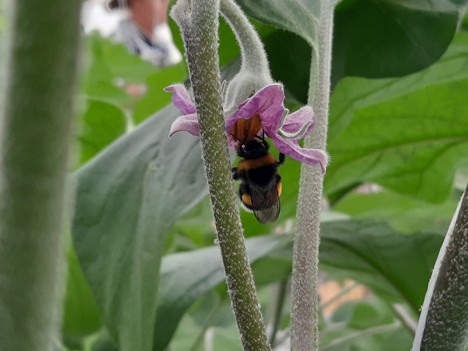How is the market evolving, and how can Sicily react to remain competitive by choosing protocols suitable to maximize production factors? Genetic improvement is the prerequisite to qualify the region's eggplant production, as it would allow it to conquer larger market shares in Europe.
 A bumblebee pollinating an eggplant flower
A bumblebee pollinating an eggplant flower
The main European markets are Spain, Italy, the Netherlands, France, and Greece. Spain is the leading eggplant exporter in Europe and almost entirely produces oval eggplants using integrated control techniques, meaning residues are low. Italy instead produces four types of eggplants (oblong, round, purple, and streaky) mainly for the domestic market.
New market trends revealed that genetic improvement is needed to change things and improve the management and costs of an agricultural company. A few seed companies have invested in easy-setting varieties, which only need the help of bumblebees and guarantee increased food safety for consumers.
These varieties are developed and selected specifically for Sicily, where plants are compact and open, with early cycles. They set easily and are suitable for various types of greenhouses (wood, iron, technological). Fruits are excellent in color and firmness, with no thorns on the calyx and a long-shelf life suitable for long transports.
The agronomic and economic data collected during the experimentation phase revealed how setting represents one of the main production costs for eggplants. Easy-setting varieties make it possible to save 85% of costs linked with pollination labor, which means a 1/3 reduction in labor costs for the total management of production. A considerable saving if we consider how difficult it is to find labor nowadays.
The varieties in question are suitable for integrated control techniques. The defense method helps save on costs and obtain low-residue produce. Easy-setting varieties, therefore, enable greater economic sustainability and fewer operators and do not require hormones.
This new way of producing eggplants makes it possible to widen the market for Sicilian production, which ensures the added value of top-quality produce.
